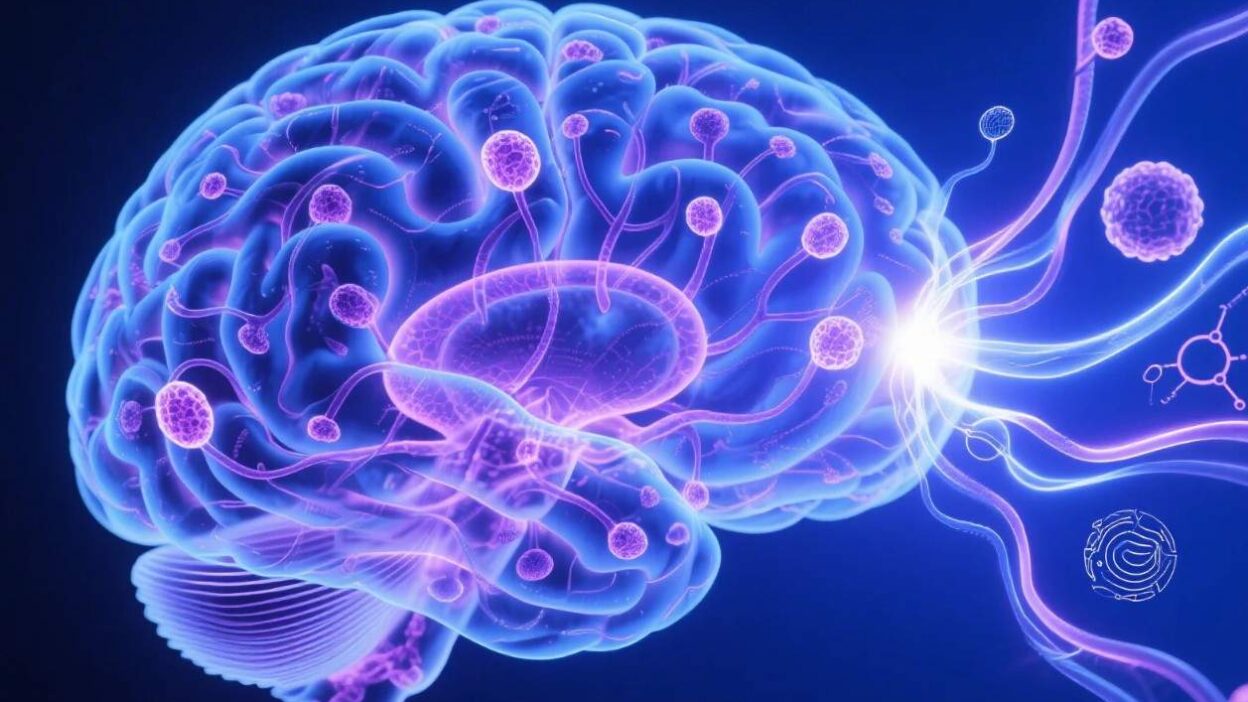How Cellular Energy Production Patterns Influence Individual Consciousness
The Mitochondrial Personality Theory proposes a revolutionary framework linking cellular energy metabolism to individual psychological traits and consciousness patterns. This interdisciplinary approach synthesizes findings from cellular biology, neuroscience, and psychology to suggest that variations in mitochondrial function directly influence personality development, cognitive processing, and behavioral tendencies. Through examining energy production efficiency, oxidative stress patterns, and mitochondrial communication networks, this theory offers novel insights into the biological foundations of human individuality.
The Powerhouse of Personality
Imagine your personality as a city’s electrical grid. Just as the efficiency and reliability of power generation determines which neighborhoods thrive and which struggle, your cellular powerhouses—mitochondria—may be secretly orchestrating the very essence of who you are. This isn’t mere metaphor; emerging research suggests that these microscopic energy factories don’t just keep our cells alive—they might be the hidden architects of our consciousness itself.
The Mitochondrial Personality Theory challenges the traditional view that personality emerges solely from neural networks and environmental factors. Instead, it proposes that the approximately 37 trillion mitochondria in the human body collectively create an energetic signature that fundamentally shapes how we think, feel, and behave.
The Cellular Energy-Consciousness Connection
Mitochondrial Heterogeneity and Individual Variation
Every person carries a unique mitochondrial profile, much like a fingerprint. These organelles vary dramatically between individuals in several key ways:
Energy Production Efficiency: Some people possess mitochondria that generate ATP with remarkable efficiency, creating what we might call “high-energy personalities.” These individuals often exhibit traits associated with extraversion, high activity levels, and reduced need for sleep. Conversely, those with less efficient mitochondrial function may naturally gravitate toward more contemplative, introverted behaviors as their cellular energy budget requires more careful management.
Oxidative Stress Tolerance: Mitochondria produce reactive oxygen species as byproducts of energy generation. Individual differences in antioxidant capacity and stress response create distinct metabolic personalities. People with robust antioxidant systems may show greater resilience to stress and more stable mood patterns, while those with higher oxidative stress might be more sensitive to environmental changes and emotional fluctuations.
Calcium Signaling Patterns: Mitochondria play crucial roles in cellular calcium homeostasis, directly influencing neuronal firing patterns. Variations in mitochondrial calcium handling could explain why some individuals are naturally more excitable or reactive, while others maintain steadier emotional baselines.
The Neuroenergetic Basis of Consciousness
The human brain consumes approximately 20% of the body’s total energy despite representing only 2% of body weight. This massive energy demand makes neural function exquisitely sensitive to mitochondrial performance variations. The theory proposes that consciousness emerges from the complex interplay between neural networks and their energetic substrate.
Different brain regions have varying mitochondrial densities and types. The prefrontal cortex, crucial for executive function and personality expression, contains mitochondria with distinct characteristics compared to those in the limbic system. Individual variations in regional mitochondrial function could explain why some people excel at analytical thinking while others are more emotionally intuitive.
Mitochondrial Personality Archetypes
Based on emerging research patterns, the theory identifies several distinct mitochondrial personality profiles:
The Energetic Optimizer
Individuals with highly efficient mitochondrial networks tend to exhibit high energy levels, quick decision-making, and strong goal-oriented behavior. Their cellular powerhouses run like well-oiled machines, providing consistent energy output that supports sustained attention and physical activity. These personalities often gravitate toward leadership roles and high-stimulation environments.
The Metabolic Contemplative
Those with more variable mitochondrial function often develop heightened interoceptive awareness—they become experts at reading their body’s energy signals. This metabolic sensitivity can manifest as deeper self-reflection, artistic inclinations, and preference for low-stimulation environments. Their personalities often reflect a more nuanced relationship with energy expenditure.
The Stress-Adaptive Dynamo
Some individuals possess mitochondria with exceptional stress-response capabilities. These cellular powerhouses can rapidly upregulate energy production during challenges while maintaining efficient baseline function. Such personalities often thrive in high-pressure situations and show remarkable resilience to setbacks.
The Harmonized Processor
Certain mitochondrial profiles excel at maintaining steady energy output across different conditions. These individuals often display consistent mood patterns, reliable performance, and balanced personality traits. Their mitochondria act like biological metronomes, providing steady rhythms that support emotional stability.
Implications for Mental Health and Therapy
The Mitochondrial Personality Theory has profound implications for understanding and treating mental health conditions. Rather than viewing depression, anxiety, or attention disorders purely as neural circuit problems, this framework suggests examining the energetic foundations of these conditions.
Depression and Mitochondrial Function: Research increasingly links depression to mitochondrial dysfunction. The theory proposes that some forms of depression might result from chronic cellular energy deficits that leave insufficient resources for positive mood maintenance and cognitive flexibility.
Anxiety and Energy Dysregulation: Anxiety disorders might reflect mitochondrial systems that operate in chronic high-alert states, burning through energy reserves rapidly and creating the physiological foundations for worry and hypervigilance.
Attention Disorders: ADHD and similar conditions could represent mismatches between mitochondrial energy patterns and environmental demands, where cellular energy production rhythms don’t align with required attention patterns.
Therapeutic Applications and Interventions
Understanding personality through a mitochondrial lens opens new therapeutic possibilities:
Personalized Energy Medicine: Treatments could be tailored to individual mitochondrial profiles, using targeted nutrients, exercise protocols, and lifestyle modifications to optimize cellular energy production.
Chronotherapy: Recognizing that mitochondrial function follows circadian rhythms, therapeutic interventions could be timed to align with natural energy cycles.
Metabolic Psychotherapy: Therapeutic approaches could incorporate real-time bioenergetic feedback, helping individuals understand how their cellular energy states influence thoughts and emotions.
Future Research Directions
The Mitochondrial Personality Theory opens numerous research avenues:
Longitudinal Studies: Tracking mitochondrial function changes over time could reveal how personality evolves with cellular aging and environmental influences.
Genetic Analysis: Examining mitochondrial DNA variations alongside personality assessments could identify specific genetic markers for different personality types.
Intervention Studies: Testing whether mitochondrial-targeted interventions can influence personality traits and psychological well-being.
Cross-Cultural Research: Investigating whether mitochondrial personality patterns vary across different populations and cultural contexts.
Challenges and Limitations
The theory faces several important challenges:
Measurement Complexity: Current methods for assessing mitochondrial function in living humans are limited and often invasive.
Causation vs. Correlation: Establishing whether mitochondrial patterns cause personality traits or result from them remains challenging.
Individual Variability: The enormous complexity of mitochondrial systems makes it difficult to create simple predictive models.
Integration with Existing Theories: Reconciling mitochondrial influences with established psychological and neurobiological frameworks requires careful theoretical work.
Conclusion: Toward a Bioenergetic Understanding of Self
The Mitochondrial Personality Theory represents a paradigm shift in how we understand human individuality. By recognizing that our cellular powerhouses don’t just sustain life but actively shape consciousness, we open new possibilities for self-understanding and therapeutic intervention.
This framework doesn’t diminish the importance of environment, genetics, or social factors in personality development. Instead, it adds a crucial missing piece to the puzzle—the energetic foundation upon which all psychological processes rest. As we continue to explore this connection between cellular metabolism and consciousness, we may discover that the ancient philosophical question “Who am I?” has a surprisingly microscopic answer: “I am the sum of my mitochondria’s energy patterns.”
The implications extend far beyond academic curiosity. In a world increasingly focused on optimizing human performance and well-being, understanding the mitochondrial basis of personality could lead to more effective, personalized approaches to mental health, education, and personal development. We stand at the threshold of a new era where the boundaries between biology and psychology dissolve, revealing the fundamental unity of cellular function and conscious experience.
As we peer deeper into the microscopic world of our cellular powerhouses, we may find that the secret to understanding human nature has been hiding in plain sight, humming quietly in every cell of our bodies, waiting for us to listen to its energetic whispers about who we truly are.
This report represents a theoretical framework integrating current research in cellular biology, neuroscience, and psychology. While speculative in nature, it provides a foundation for future empirical investigation into the connections between cellular metabolism and consciousness.



